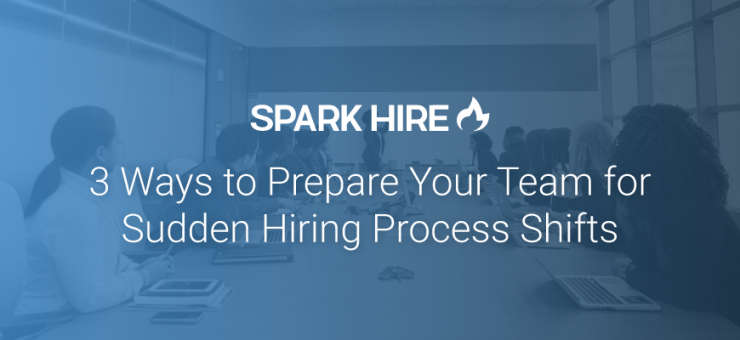Change is inevitable — but that doesn’t mean we have to like it.
In the hiring process, especially, change often means there’s an upset to your team’s normal routine. The tried-and-true steps they’ve worked diligently to test and implement could dismantle for many unexpected reasons. For instance, voluntary turnover might lead to a period of rapid growth. Or market shifts might halt the hiring process altogether.
No matter the reason, sudden change puts extra pressure on your team. Stress and frustration accumulate faster, and your team is vulnerable.
Like with most disruptions, however, there’s an upside. Shining a light on the positive outcomes of these challenges encourages your team to shake up their regular routines before an upset even occurs. Once the status quo breaks, there’s more opportunity to grow, innovate, and improve the hiring process as a whole.
But before you can do any of that, you have to prep them for the changes. Here’s how you can help your hiring team prepare for sudden hiring process shifts:
1. Find new ways to improve the screening process
Preparation for sudden shifts in the hiring process creates an opportunity to improve each of your steps, starting with screening. The challenge, no matter the future change, is understanding why employees leave the company.
Highlight your team’s ability to discover answers and innovate. Explain how potential situations require them to dig deeper into hiring metrics and improve sourcing now. Consequently, they’ll be set up in the future to spend less time on evaluating candidates in the early stages of the hiring process.
During this time, allow your team to have fun experimenting with relevant new tools. For example, let’s pretend your team is frustrated with the high rate of one-year turnovers. If sudden turnovers increased, they’d be even more challenged to fill roles with top talent.
Help them focus on new ways to improve screening evaluation techniques. Schedule time for them to practice reviewing each other’s faux one-way video interviews to investigate how they can better analyze candidate fit for each role. Make this a staple in their ongoing strategy so they’re continually prepared for sudden changes.
2. Reveal gaps in interview questions
Interview questions are the gateway to digging deeper into candidates. The right questions reveal:
- If a candidate’s application materials were accurate
- How well a candidate is prepared for a role
- The degree of cultural fit
All three of these are critical in hiring the best-fitting candidates. But if your hiring team is chugging along without a hiccup in their process, there’s no immediate reason to assess the effectiveness of interview questions. So, when they eventually hit hiring process roadblocks, they’ll be ill-equipped to overcome the challenges associated with finding new talent.
Show your team the importance of overcoming damaging interview question gaps before a shift occurs. Encourage them to look at the hard and soft skills, personality traits, certifications, and so on that former employees lacked. Ask them to use their research to collectively determine which questions need revising and where to include new additions.
Of course, you may experience pushback. There’s a possibility your team will view this drill as busywork that they don’t have time to accomplish. However, once they begin rehiring for open roles and see the clarity in job and cultural fit due to new questions, they’ll appreciate the opportunity to collaborate and evolve before times get tough.
3. Increase communication and collaboration
A sudden deviation from “business as usual” will leave your team open to disconnection. The more disconnected they feel from one another and the company, the more vulnerable they become to burnout.
Counteract any future disruption by bringing them together through communication and collaboration opportunities. Use collaboration software to boost real-time conversations regarding candidates’ interviews. Even though the dialogue revolves around candidates, the teamwork naturally increases morale and positivity.
As a bonus, save their comments for future reference. That way, your team will have everything they need to make informed decisions down the road in one easy-to-access location.
We can never predict what the future holds. The unexpected and unknown are intimidating, especially for hiring teams. Keep your team positive and prepared at all times to ensure them that no matter what’s coming their way, they’re ready to handle it.












